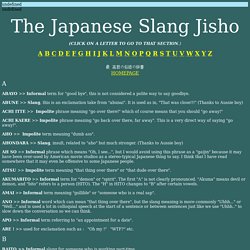

Ba Ba Dum. Japanese Reading Practice. Japanese: The Game. 47NEWS(よんななニュース):47都道府県52参加新聞社と共同通信のニュース・情報・速報を束ねた総合サイト.
Renshuu.org - Japanese studying made for you! 日本人の知らない日本語01. Backlash against Miyazaki is generational. If you haven’t lived in Japan, it’s hard to appreciate just how beloved are anime maestro Hayao Miyazaki and his creative hub, Studio Ghibli.

Annual surveys of Japanese consumers often find that Ghibli is their favorite domestic brand, ahead of stalwarts such as Toyota and Sony. Miyazaki’s animated epics regularly top the domestic theatrical market. “Kaze Tachinu” (“The Wind Rises”), his latest film — loosely based on the life of engineer Jiro Horikoshi, designer of Japan’s wartime Zero fighter plane — soared above its box office rivals for seven consecutive weeks after its July release. Meanwhile, his Oscar-winning “Spirited Away” (2001) remains the top-grossing film in Japanese history, knocking aside Hollywood live-action contenders such as “Titanic” and the “Harry Potter” films. But the rest of the world has been catching up.
But the reaction to Ghibli’s anti-war, anti-revisionist essays was ferocious, especially among Japan’s so-called netto uyoku, or right-wing Internet users. 鉄道Now. CAUSATIVE AND PASSIVE. Posted by Tae Kim We will now learn the last two major types of verb conjugations: causative and passive forms.

These two verb conjugations are traditionally covered together because of the notorious causative-passive combination. We will now go over what all these things are and how they are used. Causative Verbs Vocabulary Verbs conjugated into the causative form are used to indicate an action that someone makes happen. 全部食べさせた。 Causative Conjugation Rules Here are the conjugation rules for the causative form. Examples Here are some examples using the causative verb. 先生が学生に宿題をたくさんさせた。 When asking for permission to let someone do something, it is more common to use the 「~てもいい」 grammar. Handwritten kanji search at sljfaq.org. Learn kanji with vocabulary. Good Drama. Anime Ram. Ejcjs - front page. AJATT: All Japanese All The Time.
Erin's Challenge! I can speak Japanese. Skritter. Coolest Traveling » The Best Japanese Slang Dictionary Online. Elcome to the premier dictionary of Japanese slang and colloquialism!

Below you will find an update-to-date collection of colloquial expression, dialects, borrowed phrases, and pure, modern slang. Enjoy! P.S. Errors including typos and definitions are also welcome! Japanese Slang Dictionary Updates: -8/6/08: Added Japanese Characters and useful links.-11/18/08: Added a few more words and cleaned up some as well. Aho(u)-(あほ)-An insult along the lines of “stupid” or “idiot”. Aitsu-(あいつ)-A very impolite way to say “that person” or “that guy over there”. Ano.. Are-(あれ)-Literally means “that” (and implies mutual understanding and knowledge) but depending on the context can refer to sexual activities or parts. Are?! Asoko-(あそこ)-Literally meaning “there” (and implies mutual understanding and knowledge) but depending on the context can refer to the sexual organs. Atashi-(あたし)-A contracted form of “Watashi” that is commonly used by girls to say “I” Baba-(ばば)-An insulting way to say old lady. Eeee…. The Japanese Slang Jiko.
Undefined The Japanese Slang Jisho 最 高君の俗語の辞書HOMEPAGE ABAYO >> Informal term for "good bye", this is not considered a polite way to say goodbye.

ABUNE >> Slang, this is an exclamation take from "abunai". It is used as in, "That was close!!! " ACHI ITTE >> Impolite phrase meaning "go over there! " ACHI KAERE >> Impolite phrase meaning "go back over there, far away". AHO >> Impolite term meaning "dumb ass". AHONDARA >> Slang, insult, related to "aho" but much stronger. AH SO >> Informal phrase which means "Oh, I see AITSU >> Impolite term meaning "that thing over there" or "that dude over there". AKUMABITO >> Informal term for "demon" or "spirit".
AMAI >> Informal term meaning "gullible" or "someone who is a real sap". Language Connection.